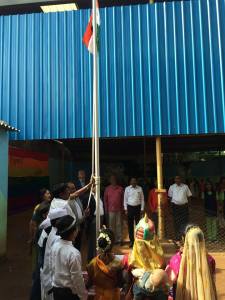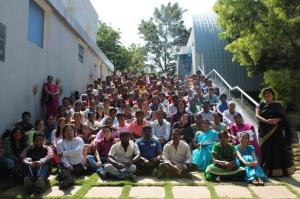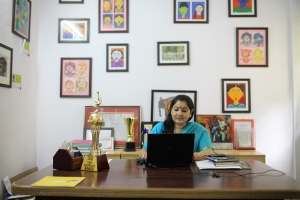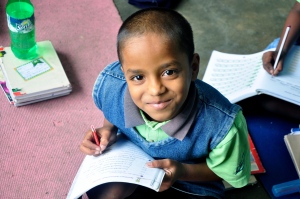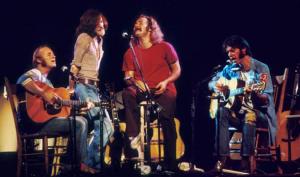Last week I had an interesting discussion with my school leadership team about the difference between authority and power. We call these informal discussions in my office, at the end of the day, our “Chats for Clarity”. Continue reading “Authority vs Power”
Tag: education
Why learning should never stop
I believe that a nation can be great if the children are allowed to think and adults are encouraged to learn.
Somehow the practice everywhere is in the reverse. It is assumed that children are not capable of doing any critical thinking and are spoon-fed at home and at schools, they are robbed of their ability to make wise choices or think creatively. It is also assumed that adults have done all the learning and have nothing more to learn. It is only when we make a paradigm shift to this equation that will any movement towards true education take place.
Can patriotism be taught?
India just celebrated its 70th Independence Day on the 15th of August. All schools and offices are shut on that day and if that day happens to be on a Thursday or a Friday most people get out of the city for a long week end. So, it is left to a motley number of conscientious schools and officials to raise the flag and exchange sweets to celebrate. At Parikrma we have always kept our schools opened, raised the Indian flag, sang patriotic songs and given an opportunity to our children to choreograph a cultural event of their own.
For me it is an opportunity to go to all our four schools and meet the students and talk to them about issues that are current and relevant. Most often, I talk about how true freedom is the one that respects someone else’s freedom. This year I spoke about the difference between Patriotism and Nationalism. Of late there have been many news about how people have been criticized of actually falling into the groove of sedition if they are not nationalistic. This trend worries me. We need to be very sure about what we want in our country, a patriot or a nationalist? A patriot is proud of his country for what it does, and the nationalist is proud of his country no matter what it does; the first attitude creates a feeling of responsibility while the second a feeling of blind arrogance that leads to a war.
As educators it is our responsibility to introduce to the minds of our students that it is possible to be connected to the world outside, to fellow exist and not just tolerate. When we teach our children that we need to tolerate all religions, all people we are actually instilling in them some arrogance. Because honestly who are we to just tolerate others? Are we in anyway superior to anyone else that we should just be tolerating them instead of co-existing with them, and actually integrating with them?
I therefore, feel it is more important to be patriotic and love our country but be open minded about all the things that are going wrong and try and do what we can. There is so much to learn from others without feeling in any way inadequate or insecure about ourselves.
We need to do something instead of just talking about it. I suppose that is the very genesis of Parikrma.
The Karma Matrix
I found this story on Karma very simple to understand.
Once a king ordered his three ministers to take a bag and go to the forest and fill the bag with fruits. The first minister thought that since the king had ordered this he should collect the best fruits and fill his bag.
The second minister thought that the king was too busy to look into the bag and check the fruits and hence, he collected whatever he could lay his hands on. Thus, his bag was filled with a mixture of good and rotten fruits. The third minister thought that the king would look at the bag only from outside and hence, just filled up the bag with dried leaves and stones.
All the three ministers came back to the court with their respective bags. The king, without even seeing what their bags contained, just ordered that the three ministers be sent to separate jails for three months. He instructed that no food was to be given to the ministers because they had to consume whatever they had collected in their bags.
The first minister could spend the three months in the jail by eating the nice fruits he had collected. The second one survived for a few days with the good fruits in the bag and then fell ill by consuming the rotten fruits he had collected. The third minister had nothing to eat and hence, could not survive.
In life too we bear the consequences of our own actions. How often have we heard that, “we reap what we sow”? Some people believe that it is not just the actions of this life but also the karmas of past lives that haunt us. So, if your life is full of misfortunes it is not only because of your actions and wrong decisions of the present life, but also what wrong you may have done in your past life.
I have often wondered how does one explain to oneself about one’s past life and the life of next birth? One can easily say, that if I have ill begotten wealth in this life which keeps me happy then why should I bother about its impact in the next life? One can also say that it is really unfair that one is paying the price for what one did in the past because what one does today should be more important. You can further say that there is no point in being good because your past is going to influence your present. Such questions have occurred to me as well.
And, then I read Dalai Lama who says that we need to be good not only for this life’s happiness but to also mitigate past life’s misdeeds. That somehow made sense. There is also actually a matrix about what kind of good deed earns how many points of good karma. While being good should come naturally because one knows no other way of living, actually counting points keeps one focused on being good.
I also believe compassion and goodness can be cultivated. If we provide an environment where there is simplicity, trust and compassion then it will provoke continuous empathy and gentle responses to situations.
I think schools and educational institutions have the responsibility to provide a gentle and compassionate environment to children. It is in an environment of collaborative rather than competitive learning that children learn to live together in harmony. And harmony clocks in the best karma.
Unfortunately, in our schools today, the focus is to finish portions and get our students to regurgitate information for good grades. Teaching our children how to win good karma is the farthest in our minds. What if we said that teaching children about good karma will win us good karmas? Will that then change our minds?
With Royalty
This is old news but still holds true. Several months ago I received the Pride of Karnataka award from the Roundtable International in a very glitzy ceremony at the Leela Palace. The other awardees of similar awards were far better known and had achieved much more than I have. So, just sitting beside them and waiting for my name to be announced was an honour by itself. And then to top the celebrity list was the Chief Guest who was none other than the new Maharaja of Mysore, Yaduveera Krishnadatta Chamraj Wadiyar, a shy young man who was trying to settle down to his new high profile role. He had many glamour quotients attached to him, all that makes any man top the charts of most women’s desired list. He is young, educated, good looking, obviously rich and most evidently powerful. I recognized his quiet dignity as he handed my award to me but I also detected a hint of familiarity in his unwavering smile. Continue reading “With Royalty”
Teachers must know their ikigai
The new academic year for the Parikrma schools (www.parikrmafoundation.org) will begin in the first week of June. In the month of May, which is otherwise a long summer holiday in all schools in South India, the Parikrma schools were busy with the Summer Program for children to ensure that they don’t go hungry and are away from harm. While the summer school was on, some of us met to plan the Orientation program for the new and old teachers. It is so important to hire the right teachers and then immerse them into the Parikrma culture and way of doing things the correct way. Continue reading “Teachers must know their ikigai”
The need for space
I am writing this from the School of Ancient Wisdom where I have come with the Parikrma leadership team for a strategy meeting to plan out the new academic year and to just breathe a little oxygen. In the hectic pace that each one of us get immersed in when the schools begin, with emergencies happening nearly everyday in our students’ homes, sometimes we forget to take – deep breaths. Continue reading “The need for space”
I have the happiest office in the world
Design, space and aesthetics have always been important to me. My mother tells me that the character of a person is determined by all the things he chooses to have around him. Continue reading “I have the happiest office in the world”
Lessons from children of Parikrma…
The other day a senior Parikrma student asked me what makes a developing country a developed one? Continue reading “Lessons from children of Parikrma…”
Making right choices
I have realized that of late, Graham Nash’s song “Teach your children well” has been playing in my head continuously. I suppose it is because I have been silently having conversations with myself about how best to educate the children that come to Parikrma schools.
To refresh your memory this beautiful song that has travelled right through the 70s to as recent as 2015 in the series Glee, was originally sung by Crosby, Stills, Nash & Young. Nash was inspired by the photograph done by Diane Arbus called ‘A child with a hand grenade’. The song is all about the impact adults can have on children and the influence children have on us. While the melody is haunting it is the lyrics that make this song a classic.
“You, who are on the road must have a code that you can live by,
And so become yourself because the past is just a good bye.
Teach your children well, their father’s hell did slowly go by,,
And feed them on your dreams, the one they pick, the one you’ll know by.
Don’t ever ask them why, if they told you, you would cry,
So just look at them and sigh and know they love you.”
Nash had a troubled relationship with his father and in this poem he recalls the turbulent life that his dad led before being imprisoned. Nash could have easily got influenced by his father but held his own and even got an OBE for his music and charity several years later.
I agree with Nash that the best teaching is not just with words but with demonstrated action. It is so easy for us to stand in a classroom and prescribe what children should do but they also need something to follow.
We need to “teach our children well” about not only how to solve a complicated algebra problem but make the right choices in life. Children need to know that there will be many crossroads in their lives. And what will lead them to the destination is the choice they make. While it need not always be the “road less travelled” they need to choose the path that resonates with their heart, values and ambitions.
How should children be taught to make the right choices? The western world is all about following your heart, doing what you want and not let anyone come in the way. The traditional eastern world believes in duty to the family, social responsibility and staying away from sole self-gratification. So, does a choice have to be wise or delightful? The right answer will always allude us hidden behind the subterfuge of context, culture and varying circumstances.
I think it is best to simplify it for our children and just say that their choice should be what they really want as long as it does not hurt anyone else. They should be taught how to contemplate, to determine how serious they are about their choice. I am sure that is sometimes possible.
But it is best if we share a story about a choice that we have made in our lives because I am sure each one of us has one.


